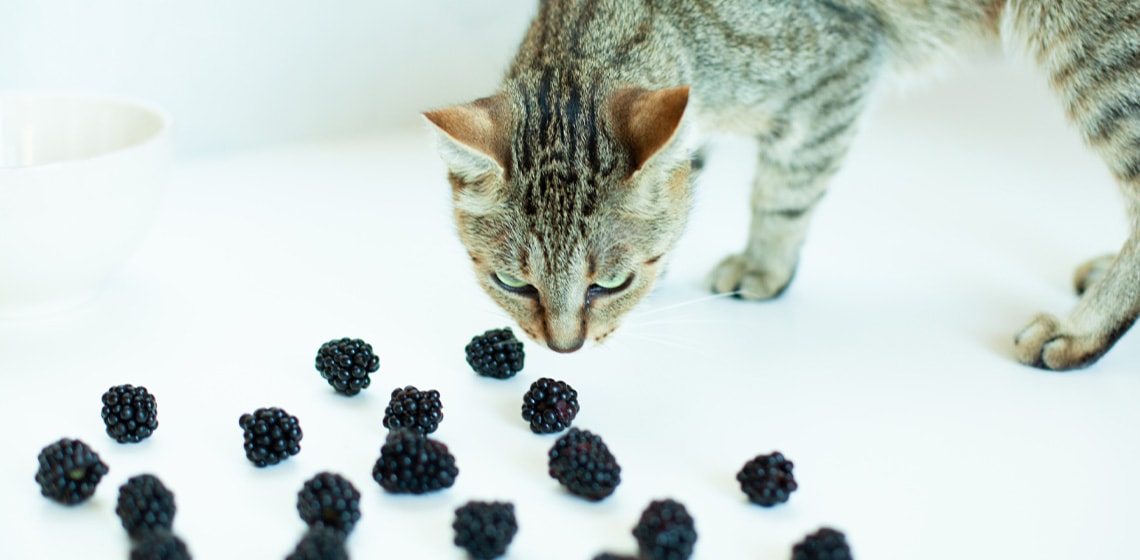If you’re the proud pet parent of a feline family member, you might watch them eating the same food day in and day out and feel sorry for them. After all, everyone likes a bit of variety, don’t they? So, if you find yourself wondering what you can offer your cat to spice up their diet a bit and keep them healthy, your first thought might be fruits and vegetables. Fruits and vegetables are super healthy for us, so isn’t it the same for our feline friends? Yes, indeed, cats can also benefit from some fruit and veggies in their diet. You can find a list of fruits that are safe for cats here. So, what about blackberries? Can cats have blackberries? Let’s find out.
Table of Contents
What are blackberries?
Blackberries are soft, edible fruits that grow on the bramble plant. The bramble, or the Rubus plant, is part of the rose family and its fruits ripen at the end of summer. It can be found in most of Europe, North America, and Canada. The name ‘blackberry’ refers to the ripened fruit, but the fruits begin as a pale green color and gradually turn darker red and purple as they ripen.
Blackberries a great source of fiber, which will help to keep your kitty’s gut healthy and their stools regular.
What are the potential benefits of feeding blackberries to cats?
Blackberries are considered a superfood for humans. They are packed full of antioxidants, which reduce organ and tissue damage from free radicals, aid healing, and reduce inflammation. In addition to antioxidants, they also contain vitamins A, C, E, and K – they’re not called a superfood for nothing! They’re also a great source of fiber, which will help to keep your kitty’s gut healthy and their stools regular.
Being low in fat means that they’re a healthy option compared to other human food treats and won’t lead to obesity. So why not put down that cube of cheese and reach for a blackberry instead?
Whole blackberries are a choking hazard because they could block your cat’s airways.
Are there any risks to feeding blackberries to cats?
The main risk associated with blackberries is to do with their shape and size. Whole blackberries are a choking hazard because they could block your cat’s airways. Therefore, it’s always best to slice them into smaller sections to avoid any danger.
Blackberries are also high in sugar, so if your cat eats too many, it could lead to diabetes or weight gain. On the other hand, it’s unlikely that your cat will want to eat such a large amount, so they should be fine as long as you moderate it.
Finally, when feeding your cat any new food, there’s a potential that it could cause an upset stomach. If your cat develops vomiting or diarrhea after eating blackberries, you should avoid them in the future.
How many blackberries can a cat eat?
If your cat has never had blackberries before, it’s best not to suddenly give them a large portion because it could give them some sickness or diarrhea. Instead, start by offering a small amount the size of your little fingernail, then monitor for any symptoms. If your cat enjoys the blackberry and doesn’t seem unwell, you can offer a little more next time. A portion of two or three blackberries is more than enough in one sitting, though.
If your cat has never had blackberries before, it’s best not to suddenly give them a large portion because it could give them some sickness or diarrhea.
How often can you feed your cat blackberries?
Cats are obligate carnivores, so they need lots of animal protein in their diet. It’s important to remember this when you’re searching for extra titbits to offer them. Any little extras they have from you will reduce the amount of their nutritionally balanced cat food that they eat. So, to make sure you don’t cause a nutritional deficiency, you should offer blackberries no more than once or twice a week.
Summary
It’s nice to share some human food with your feline friend sometimes. If you’re looking for something tasty but not too unhealthy, you can’t go far wrong with a blackberry! Blackberries are full of health-boosting nutrients to keep your feline family member feeling fighting fit for years to come. But if your cat suddenly feels unwell after eating something out of its regular diet, you should have them checked by a veterinarian.
FAQ
Thankfully, most berry fruits that humans can eat are also safe for cats. However, you should always make sure that berry-bearing plants in your garden are safe for your furry friend. For example, winterberries (holly berries) and mistletoe berries are both toxic to cats.
Grapes and raisins are toxic to cats and can rapidly lead to kidney failure if they are eaten. Other fruits like cherries and apples contain cyanide in their pits and seeds and the unripe fruit. It’s also worth remembering that many citrus fruits, including lemons, limes, and grapefruits, can upset your cat’s stomach.
If you’re wondering if you can feed your cat other fruits, like pineapple, why not find out by clicking here.
Thankfully, the leaves of the bramble plant are not toxic to cats. This is also true for the roots, stems, flowers, and unripe fruit, so if your cat fancies foraging for their own fruit, they can! Don’t forget, though, that it’s much easier to avoid the choking risk if you prepare the blackberries yourself.
Blackberries are a safe fruit for cats and dogs. However, that doesn’t mean too many won’t upset their stomach. Make sure you offer a small amount at first to let your dog or cat get used to it. As long as they don’t develop any unpleasant symptoms, you can gradually offer them a little more. Keep offering their nutritionally complete kibble or meat, though, because this will contain all the nutrients they need.








